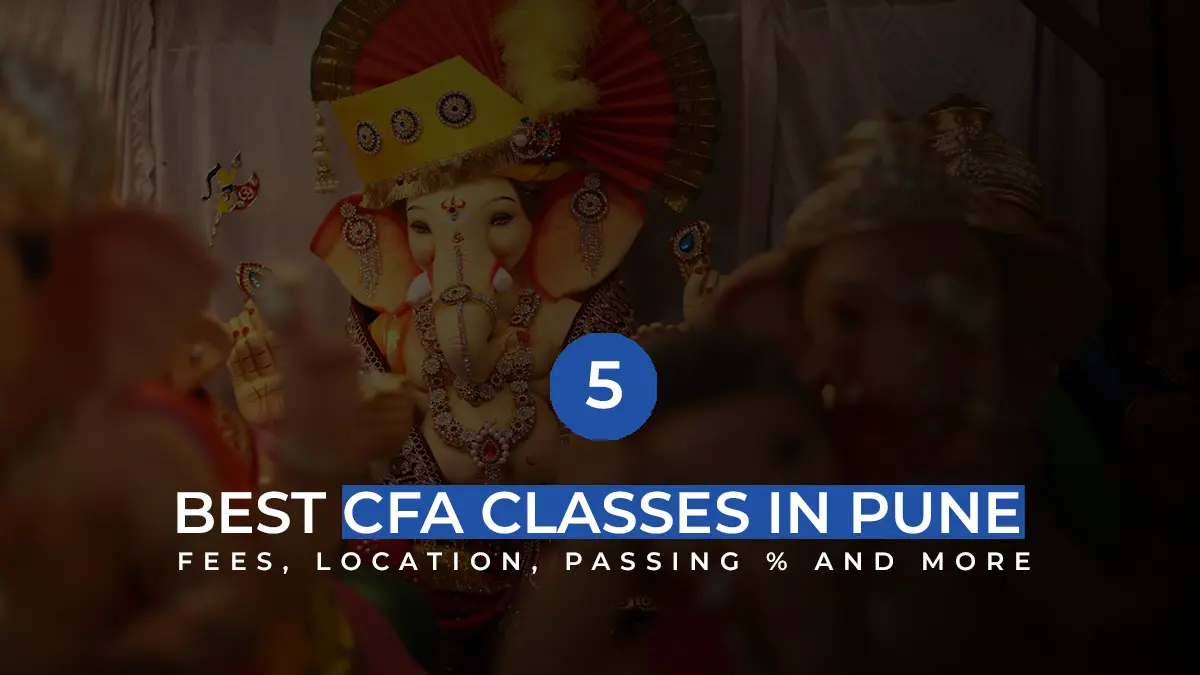
Ever wondered which path to take when both seem equally great? Imagine having to pick between two exceptional options: CFA or MBA in Finance. So, which one to pick?
Deciding between a CFA and an MBA in Finance is challenging. They both have their advantages and can unlock significant opportunities. Consider the world of finance as a complex puzzle, and your choice of degree is the piece that helps you solve it. This puzzle is about making prudent financial decisions, and having the appropriate degree is crucial.
Before the CFA credential, top-tier employees were sent to business schools, offering improved general business skills but lacking specialized asset management abilities like portfolio management. These specialized skills were typically gained through job experience rather than formal education. Business school skills suited to broader roles like marketing or general management. In contrast, the CFA program focuses on specialized skills like investment analysis and portfolio strategy, offering a deeper, more concentrated study in these areas. Comparatively, the MBA covers a wider breadth of topics but with less depth, while the CFA is narrower but goes much deeper.
In 2024, amidst a multitude of career opportunities, choosing between a CFA or an MBA in Finance is about crafting your narrative for a finance career that aligns with your aspirations and the demands of the finance industry. Let’s understand these two fields better.
Overview of MBA in Finance
A Master’s in Business Administration (MBA) with a focus on finance is a specialized program that dives into the intricate workings of money management within businesses. It offers in-depth insights into financial strategies, investments, and how companies handle their finances. This specific course within the broader MBA program sharpens your skills in navigating the financial aspects of the corporate world.
Pros of Pursuing an MBA:
- Top-tier companies highly prefer MBAs from top B-schools.
- A strong CAT exam score qualifies you for IIM courses.
- Suited for ambitious individuals seeking managerial roles.
- MBAs often ascend to prominent positions like CEO, CFO, and COO.
- Emphasizes developing personal skills: communication, analysis, and decision-making.
- No prior work experience is needed for program eligibility.
Cons of Pursuing an MBA:
- Time and Cost: MBA programs often require a substantial investment in terms of time (typically two years) and cost (tuition fees and opportunity cost).
- Broad Focus: While it covers various business areas, it may not offer the same depth of financial knowledge as specialized programs like the CFA.
- Entry-Level Positions: In some cases, an MBA might not guarantee an immediate jump in career levels or salary, especially without prior work experience.
Comparatively, the CFA program primarily focuses on finance and investment management, offering a more specialized and in-depth understanding of financial concepts. Both paths have their advantages and limitations, and choosing between them depends on career goals, interests, and desired expertise.
Overview of the CFA Program
The Chartered Financial Analyst (CFA) program is a globally recognized certification in finance. This course equips individuals with comprehensive knowledge and skills in investment management and financial analysis. It covers a broad range of topics, including ethics, economics, portfolio management, and more. The CFA designation is highly esteemed in the financial industry, offering a pathway to career advancement in various sectors. Let’s dive into its key aspects.
Pros of Opting for the CFA Program:
- Focused Financial Education: The CFA Program offers a specialized and in-depth understanding of financial analysis, investment management, and portfolio management.
- Global Recognition: It’s globally recognized, offering credibility and opening doors to job opportunities in the finance and investment sectors worldwide.
- Flexible Study Options: Candidates can pursue the CFA Program while working, allowing them to apply practical experience to their studies.
- Professional Ethical Standards: Emphasizes and integrates high ethical and professional standards, essential in the finance industry.
Cons of Opting for the CFA Program:
- Rigorous and Time-Intensive: The CFA Program demands significant time commitment and rigorous study, especially for each of its three levels.
- Specialized Focus: While it’s comprehensive in finance, it might lack the broader business perspectives offered by an MBA program.
- Career Scope: The CFA Program is specialized and primarily suitable for roles in investment banking, asset management, and financial analysis.
The CFA Program offers a rigorous and specialized education in finance, focusing on investment management. However, its narrower scope might not suit individuals seeking broader business expertise. It’s essential to consider personal career goals and preferences when choosing between the CFA Program and other academic paths like an MBA.
Also Read – 6 Important CFA Updates & Curriculum Changes Announced in 2023 | IMS Proschool
Comparison: CFA vs MBA in Finance
|
Description |
MBA |
CFA |
| Board Affiliation | Affiliated with the AICTE, UGC, and MHRD boards | Created by the CFA Institute in the USA |
| Course Duration | Two-year intensive program | Levels 1,2, and 3
Completed in 1.5 to 4 years |
| Eligibility Criteria | Graduate in any discipline | Graduate in any discipline |
| Fees | Ranges from INR 11 to INR 35 lakhs
IIMs comes to around INR 23 Lakhs |
Total cost between INR 2 to 5 Lakhs |
| Course Structure | 1st year: General Management
2nd year: Specialized Subjects |
Divided into three levels
10 Subjects |
| Focus Area | Broad list of business concepts | Investment tools & valuing assets |
| Study Mode | Register with affiliated university, on-campus | Register with coaching institute, study online or in a classroom |
| Difficulty Level | Pass rate depends on the university grading system | 38% pass rate for Level 1 |
| Exam Schedule | Four exams at the end of each semester | Exams at end of each CFA level |
| Award for Completion | Degree certificate | Professional designation |
| Career Options | Private banking, risk management, asset management, investment banking, consulting, business management, portfolio management, financial analysis, strategist | Investment management, hedge funds, equity research analysts, wealth management, insurance, banks, investment analysis, portfolio management, strategy, wealth management |
| Requirements | Master’s degree (2-3 years) | 3 exams and one of the following: bachelor’s degree, be within 23 months of graduation from the date you sit for the Level 1 exam, combination of 4,000 hours of full-time work experience and university education accrued over a minimum of 36 months |
| Recognition
Validity |
Not a requirement for most positions
Depends on the University Tier |
Preferred by nearly 90% of executive and senior level positions in investment management positions
Global (192 countries) |
| Salary | MBA average salary in India: INR 7 to 20 lakhs
IIM Graduate Salary in India: INR 20 to INR 25 Lakhs |
CFA average salary in India: INR 5 Lakhs, Top professionals can earn 20+ Lakhs annually |
| Professionals | 100,000+ degrees awarded annually | 178,000 |
| Key Summary | Broad field of careers across marketing, finance, management, etc. | Focus on investing in large-scale corporate situations |
*The lowest calculation presupposes passing each of the three exams on the initial try.
The displayed fees do not include any local VAT, Goods and Services Tax (GST), or any other sales tax that candidates in their country of residence are liable to pay. In instances where the CFA Institute needs to include sales tax at the locally mandated rate, it will be appended to the fees indicated during the payment process.
Did you know, 84% of our students recommend that you join Proschool for your CFA Prep.
Advantages of Doing Both CFA and MBA
Combining a Chartered Financial Analyst (CFA) qualification with a Master of Business Administration (MBA) holds a ticket to an enriched career journey. Picture this: it’s like having a supercharged toolkit blending deep financial insight with broad business skills, paving the way for diverse job opportunities and higher earning potential.
Elevate Your Career Trajectory
The CFA and MBA combo opens doors to top-tier roles—from finance roles like investment analysis and portfolio strategy to steering the ship as an executive leader. This dual blend of finance mastery and savvy business skills sets you apart across various industries.
Boost Your Earning Power
Having both these qualifications in your arsenal can mean a better paycheck. The specialized financial expertise, combined with strategic business know-how could mean a higher salary tag. It’s your unique edge in climbing the career ladder and negotiating better rewards.
Widen Your Job Horizons
With a CFA and an MBA, your job radar spans far and wide. Think finance, consulting, corporate strategy, and even entrepreneurial ventures. The combo opens the doors to diverse career paths, making you a sought-after asset in the job market.
In short, pairing up a CFA with an MBA isn’t just about stacking degrees; it’s about supercharging your career prospects, beefing up your earning potential, and opening doors to a world of professional opportunities.
Also Read – How CFA Program Helps You Run a Business
CFA vs MBA Finance Job Profiles & Salary in India
CFA Job Profiles in Finance:
| Job Profiles | Description |
| Investment Analyst | Conducts in-depth research, evaluates financial data and makes investment recommendations. |
| Portfolio Manager | Oversees investment portfolios, makes strategic decisions, and manages client assets. |
| Financial Consultant | Provides specialized advice on financial planning, risk management, and investment strategies. |
| Risk Manager | Assesses and mitigates financial risks for organizations and portfolios. |
| Wealth Manager | Advises high-net-worth clients on investments, estate planning, and wealth growth. |
MBA Job Profiles in Finance:
| Job Profiles | Description |
| Financial Analyst | Analyzes market trends, financial statements, and performance metrics for decision-making. |
| Business Development Manager | Identifies growth opportunities, builds partnerships, and expands business operations. |
| Corporate Finance Manager | Manages financial planning, budgeting, and forecasting for companies. |
| Investment Banker | Facilitates corporate financial transactions, mergers, acquisitions, and capital raising. |
| Management Consultant | Advises companies on strategy, operations, and organizational improvements. |
Get 200+ hrs of CFA Training, Mock Tests, Exam Pass Commitment and much more when enrolling for CFA Course @ Proschool
CFA vs MBA Finance Salary in India
| Qualification/Level | Average Starting Salary (in INR) |
| MBA (Finance) | 15 LPA to 20 LPA |
| CFA Level 1 | 4 – 5.4 LPA |
| CFA Level 2 | 6 LPA |
| CFA Level 3 | 10+ LPA |
| Job Profile (CFA) | Average Starting Salary (in INR) |
| Financial Analyst | 6 LPA to 7 LPA |
| Portfolio Manager | 6.5 LPA to 7.5 LPA |
| Finance Manager | 9 LPA to 10 LPA |
| Financial Advisor | 4 LPA to 5 LPA |
| Investment Banker | 9 LPA to 10 LPA |
| Hedge Fund Manager | 10 LPA to 15 LPA |
| Qualification | Average Starting Salary (US$) |
| CFA | $98,000 |
| MBA | $92,000 |
Factors Influencing Salary Discrepancies: CFA vs MBA in India
In India, several factors contribute to the salary differences between professionals holding a CFA and those with an MBA. Here’s an outline:
- Educational Focus: The specialized focus of a CFA on finance and investment might yield higher salaries in those specific fields compared to the broader management education provided by an MBA.
- Industry Demands: Specific industries value CFAs more than MBAs, leading to variations in salaries across sectors like investment banking, asset management, or financial advisory roles.
- Professional Expertise: Job roles vary in complexity and expertise required. Positions demanding intricate financial expertise may prefer CFAs over MBAs, potentially offering higher compensation.
- Work Experience: The years of professional experience coupled with educational qualifications contribute to the salary range. CFAs often have a defined skill set that might be valued differently from the managerial skills acquired through an MBA.
- Geographic Variations: Salary disparities can arise due to regional differences in the demand for certain qualifications. Metro cities might offer higher pay for CFAs owing to greater financial opportunities.
- Industry Certifications: Some industries value additional certifications that complement CFAs, influencing salary levels compared to general management roles typically pursued by MBAs.
These factors combine to shape salary discrepancies between CFA and MBA professionals in India. The industry’s specific requirements, individual skill sets, and the value placed on specialized financial expertise are crucial in determining compensation variations.
Also Read – CFA Scholarship – Are you eligible for it?
Understanding Your Niche & Decision-Making
Understanding your niche within the finance industry is pivotal. Identifying your specialized area of interest—be it investment analysis, portfolio management, or financial consultancy—helps tailor your career path effectively. The nuanced knowledge gained through focus in a specific niche allows for better career growth and expertise development.
Choosing between pursuing an MBA or obtaining a CFA designation can be a critical decision in establishing a strong foundation in finance. While an MBA offers a broader spectrum of business management skills, the CFA path dives deeper into investment and financial analysis. Evaluating your career goals, preferred skill set, and industry demands will aid in making the optimal choice for your career aspirations.
IMS Proschool stands out for its commitment to guiding and supporting you through your professional journeys. ProSchool’s faculty consists of curated industry experts delivering top-notch experiential learning. Proschool goes beyond training by prioritizing placements, providing interview preparation, and aiding in resume building to foster career growth. Unique learning systems emphasize practical application and skill enhancement, guided by mentors devoted to unlocking individual potential. With flexible learning schedules catering to the diverse needs of both working professionals and students, IMS Proschool ensures convenience without compromising on credibility, reliability, and effectiveness.
Our faculty also helps students with their study plans & scholarships
FAQs
-
How do CFA or MBA in finance help land high-paying jobs in India?
It significantly enhances job prospects by equipping individuals with specialized knowledge. CFAs often excel in roles like investment banking, asset management, or portfolio management, commanding higher salaries due to their deep financial expertise. MBAs in finance generally secure roles in corporate finance, consulting, or business development, leading to well-paid managerial positions.
-
Can combining CFA and MBA programs significantly enhance career opportunities?
Combining CFA and MBA programs can notably expand career opportunities. The dual qualification offers a unique blend of comprehensive management skills from an MBA and specialized financial expertise from a CFA. This combination enhances one’s ability to secure high-level positions in various sectors, especially in finance, providing a competitive edge in the job market.
-
What are the practical benefits of having both MBA and CFA qualifications in India?
Possessing both MBA and CFA qualifications in India brings practical advantages. It showcases a broad skill set covering finance, management, and investment expertise, making individuals versatile professionals. This duality not only increases employability but also boosts the chances of landing roles that demand a strong understanding of both financial intricacies and managerial capabilities.
-
Are there specific advantages to doing a CFA after an MBA, or vice versa?
Yes, pursuing a CFA after an MBA or vice versa has specific advantages. An MBA followed by a CFA enhances financial knowledge after gaining managerial skills, allowing individuals to transition into specialized finance roles seamlessly. Conversely, obtaining an MBA after a CFA might deepen one’s management expertise, complementing their financial acumen for leadership roles.
-
How does combining CFA and MBA studies shape a career in India’s financial sector?
Combining CFA and MBA studies molds a career in India’s financial sector by creating well-rounded professionals. It provides a unique skill set encompassing financial analysis, investment strategies, managerial proficiency, and leadership qualities. This combination is highly valued in finance-centric industries, offering opportunities in various domains such as investment banking, corporate finance, or asset management.







The analysis of CFA and MBA in Finance is comprehensive and insightful. Thank you for providing clarity to all aspiring financial professionals.